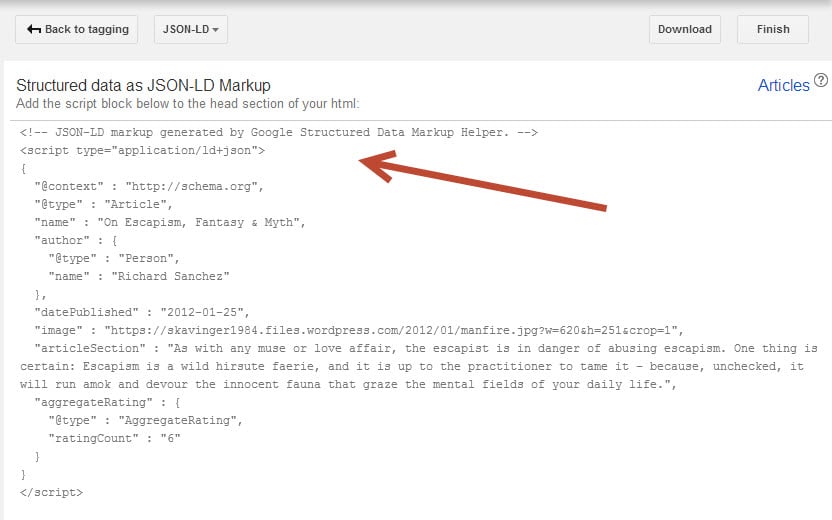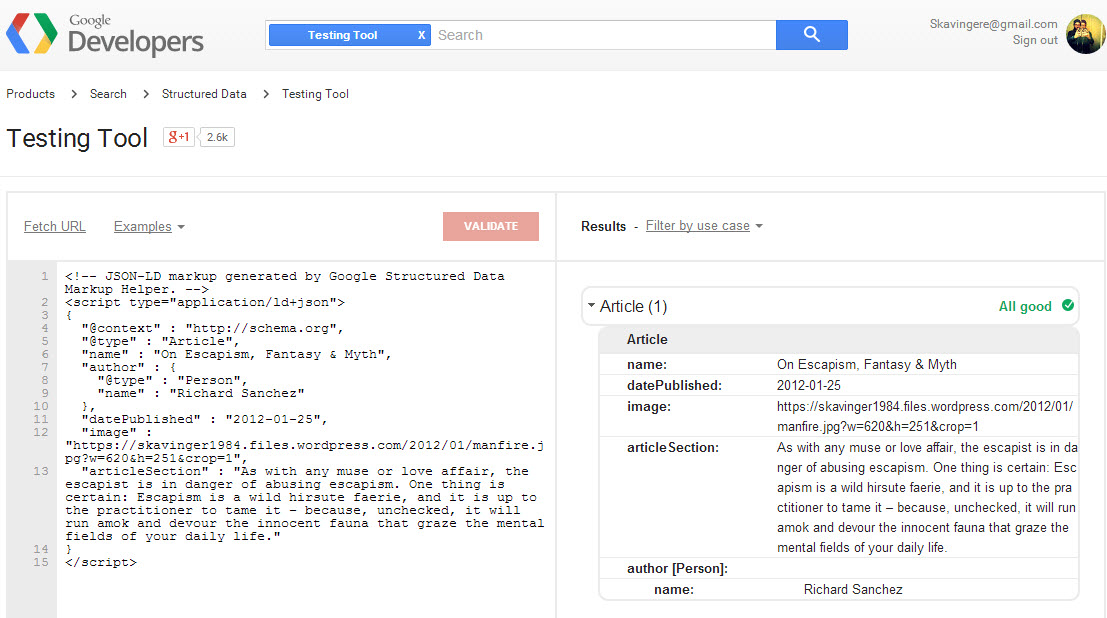
JSON-LD (JavaScript Object Notation for Linked Data) is a lightweight Linked Data format that is relatively easy to implement on your webpages, especially in lieu of Schema and other forms of microdata.
JSON-LD Solves The Problem of Messy Microdata
While it is defined as a “data format for programming environments”, JSON-LD can be applied in an SEO environment that solves the problem of microdata being messy, disconnected and time-consuming. Similar to Schema markup and now an official Web standard, JSON-LD gives search engines a better idea of:
- What your pages are about.
- How the content of your site or landing page interoperates with similar or related forms of content across the Web.
Unlike microdata, however, JSON-LD can be applied on webpages without requiring the presence of actual text. That is to say, all the requisite structured data can be contained within <script> tags, rather than fastidiously wrapping HTML properties.
It Took Me a While to Get Comfortable with Microdata. Where do I Start with JSON-LD?
The short answer is Google’s Structured Data Markup Helper (Google login required). The following is a brief walkthrough that utilizes this tool as a starting point for generating JSON-LD.
- Begin by navigating to the tool in your browser.
- Plug in the target page’s Web address in the URL field (in this case, I will use an old post from my blog, In Harsh Light, under an Article data type) and click on “Start Tagging”:

- If you are familiar with Google’s Data Highlighter (Google login required), then the Markup Helper’s tagging system will feel right at home. Simply highlight the portions of text that correspond with the data type’s tags, and once you are done, hit “Create HTML”:

- On the “View HTML” page, hover over the “Microdata” drop-down box and choose “JSON-LD”. Your JSON-LD structured data will automatically generate. Here, you can simply copy/paste the structured data to the body section of your landing page’s HTML, where you see fit. Note: The LD I used for this example is incomplete and is only meant to serve as a visualization:

In terms of blogging, a salient benefit of using JSON-LD over microdata is its compatibility with the WordPress platform. To this day, WordPress automatically removes <span> tags containing microdata. Because JSON-LD is a script, however, its structured data persists in the WordPress visual editor and leaves it intact.
- As with microdata, you can also use Google’s Structured Data Testing Tool (Google login required) to Validate your JSON-LD and address any potential errors:

Once you have gotten comfortable with this form of structured data, go further by using the JSON-LD Playground and experiment with other data types, such as Person, Event, Place or Product. This is a great place to generate a more detailed template for your target webpage.
Does JSON-LD Have a Future?
For the long-term, JSON-LD is expected to grow. It is already compliant with various ontologies, such as Good Relations, Productontology.org, and Friend of a Friend (FOAF). We are also starting to see random support from the “SEOsphere” at large, such as this simple JSON Generator for Local Business by V1 SEO in the UK:

Moreover, according to a March 9th post on Webmaster Central Blog, Google advises that Web developers now use JSON-LD in conjunction with Web Components and Custom Elements to help standardize the process. This is another indication that Google is taking the Linked Data format seriously.
Conclusion
As we know, the Semantic Web depends on copious amounts of data being connected. As such, onboarding large amounts of microdata across a site (or sites) can be unsustainable and can yield a high probability of error, obviating the intended benefit of microdata altogether.
Until recently, Google was not a big fan of “cloaked data” in your body text, which is why it generally prefers microdata. The fact that JSON-LD is now supported by the Markup Helper, however, says a lot about the search monopoly’s enthusiasm for creating a better, more interconnected Web that is scalable for Webmasters.
Further Reading & Resources on JSON-LD
As with any new form of structured data, the landscape is constantly changing. The following are a list of resources mentioned in the post above to keep up-to-date with JSON-LD, as well as a couple helpful videos:
- See David Lindahl’s Slideshare presentation on JSON-LD
- JSON-LD Site: http://json-ld.org/
- JSON-LD Playground: http://json-ld.org/playground
- Structured Data Markup Helper: https://www.google.com/webmasters/markup-helper/
- Structured Data Testing Tool: https://developers.google.com/structured-data/testing-tool/
- JSON Generator for Local Business: http://www.v1seo.co.uk/json/
- What is JSON-LD? https://www.youtube.com/watch?v=vioCbTo3C-4
- What is Linked Data? https://www.youtube.com/watch?v=4x_xzT5eF5Q
- To learn more, reference http://schema.org/Article
- View the structured data for this blog post in the Structured Data Testing Tool (Google login required)